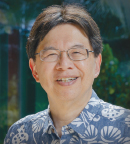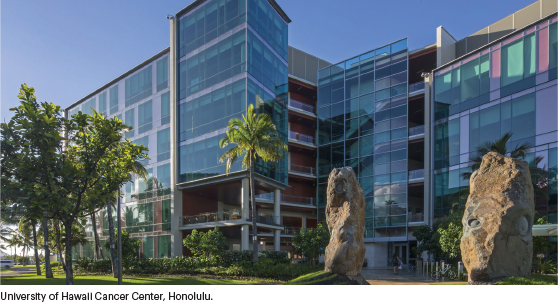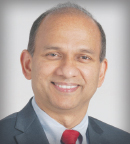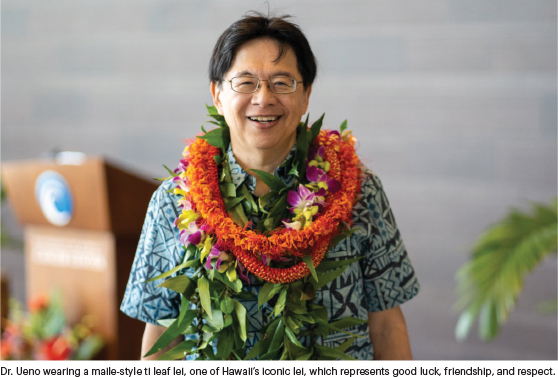In this installment of The ASCO Post ’s Living a Full Life series, guest editor Jame Abraham, MD, FACP, spoke with Naoto T. Ueno, MD, PhD, FACP, Director of the University of Hawaii Cancer Center. Along with his duties leading the cancer center, Dr. Ueno leads translational breast cancer research in the areas of cancer biology, immuno-oncology, and molecular therapeutics. He is one of the leaders in conducting clinical research and early-phase clinical trials related to aggressive breast cancer and has led more than 50 clinical trials.
NAOTO T. UENO, MD, PhD, FACP

On learning from mentors: “Dr. Mien-Chie Hung was a terrific mentor. A very strong basic and translational researcher, he made sure I knew the dos and don’ts of academic research. Dr. Hung guided me through every step of my career. And Dr. Gabriel Hortobagyi and Dr. Richard Champlin taught me about clinical translational work and how to bring knowledge from the lab into the clinic.”
On the goals of his cancer center in Hawaii: “We have a lot of access-to-care issues. Unfortunately, Asian American, Native Hawaiian, and Pacific Islander individuals are definitely underrepresented compared with any other ethnic groups. We are the only NCI-designated cancer center that could enrich this population, as 75% to 80% of the participants in our trials are non-White.”
On the words he lives by: “For me, work and personal life coexist. I try to live life to the fullest extent. To that end, I try not to predict the outcome of what I’m doing nor to overanalyze things; I want to make sure I don’t live with regrets. I enjoy what I do and what I see. I think people should enjoy what they’re doing; it is the key to success and happiness.”
Dr. Ueno was born in Kyoto, Japan, and lived there until age 7, when his family moved to the United States. “My dad was a chemist and was a postdoc at MIT. Eventually, he took a job with a Japanese tire company in Akron, Ohio, a headquarters for Goodyear. My favorite place to visit was Cedar Point or Geauga Lake when I was a kid. I returned to Japan for part of my junior year and high school. I eventually pursued my medical degree at Wakayama Medical University,” he shared.
Asked about his decision to pursue a career in medicine, Dr. Ueno replied: “That decision is really not that inspiring. I was strong in science and interested in pursuing a field that could impact humanity on a public level, so I thought about public service. However, my Japanese language skills weren’t strong enough for a career in politics, so I gave up looking at things in the science arena where language was not a major requirement. My decision to become a doctor was more of a practical choice than anything else, but it worked out.”
A Young Doctor Looking for a Career Path
In Japan, medical school is 6 years, but students go directly from high school, which meant Dr. Ueno was 22 years old when he became a doctor. “Because of my background, spending my childhood in Akron, I was interested in U.S. medicine but wasn’t confident I could really go back and practice medicine in the States. I lived in Yokosuka, the Kanagawa Prefecture, where the U.S. Navy’s Seventh Fleet is stationed, and I had the opportunity to do a rotating internship at the U.S. Naval Hospital. The internship included internal medicine, OB-GYN, and pediatric surgery, I narrowed it down to internal medicine in the naval hospital,” he recalled.
Back to the United States
After his first year at the U.S. Naval Hospital, Dr. Ueno returned to the States for a 3-year clinical internal medicine residency at the University of Pittsburgh Medical Center. “After my residency, I went to MD Anderson for a medical oncology fellowship. I decided to go back to graduate school for my fellowship, joined The University of Texas Graduate School of Biomedical Science, and dropped the hematology fellowship part; I am board-certified in medical oncology alone. Then, I moved into the PhD program. From the second year, I did 5½ years of PhD in cancer biology,” he said.

Dr. Ueno continued: “I was always fascinated by the complex biological story behind cancer and became captivated with stem cell transplant and breast cancer research. In fact, my initial career started as a stem cell transplant physician in the breast cancer area. I know that the area of using stem cell transplant in breast cancer has completely collapsed, but that’s how I started my career. I was one of the first investigators to do allogeneic stem cell transplantation for metastatic breast cancer. And Rick Childs was my good friend, and he did allogenic transplant for kidney cancer. So, we were exploring solid tumor and allogeneic transplants by graft-vs-tumor effect. This was in the mid-1990s, and that was pretty much what I concentrated on during that period.”
Doctoral Work
Asked about his doctoral work at The University of Texas Graduate School of Biomedical Sciences, Dr. Ueno shared these comments: “My doctoral mentor was Mien-Chie Hung, PhD, who cloned the human complementary DNA of HER2. My research was about understanding the promoter of HER2 regulation. My thesis was about using this adenovirus component called E1A, which suppresses HER2 promoter activity, and then actually ends up with less tumorigenicity, and less metastatic disease. I worked with Gabriel Hortobagyi on this, and he was a PI. And then, we actually did a gene therapy based on E1A targeting high HER2-overexpressing breast and ovarian cancers. And delivering this E1A by liposome is what I did. And then I was eventually hoping to combine gene therapy with some kind of immune component by regulating HER2. Of course, it didn’t happen that way, but that’s what I did for my PhD. It was a very productive time in my career.”
“I was always fascinated by the complex biological story behind cancer and became captivated with stem cell transplant and breast cancer research.”— NAOTO T. UENO, MD, PhD, FACP
Tweet this quote
Dr. Ueno continued: “Dr. Mien-Chie Hung was a terrific mentor because he talked about what mentorship is about, how academic science works. He was a very strong translational researcher and explained how to take basic research into the clinic. But what he really was good about is how to interact with collaborators. Dr. Hung took time to nurture me and make sure I knew the dos and don’ts of academic research. He guided me through every step of my career. And Dr. Hung’s mentor is Bob Weinberg, PhD. So, my grand mentor was Dr. Weinberg.”
Dr. Ueno shared some thoughts on what he learned from two mentors: “Dr. Hortobagyi taught me about translational work and how to bring knowledge from the lab into the clinic. For the transplant part, my mentor was Dr. Richard Champlin, one of the leaders in developing allogeneic transplantation. I cannot say enough about the importance of mentoring young fellows and clinician-scientists at the beginning of their careers. I was very fortunate in my own career and try to pass down many of the things I learned along the way.”
“I’ve been working with our team to become a DEI-driven cancer center that addresses our unique health disparities and provides the best cancer prevention and treatment driven by research. That’s what I’m passionate about.”— NAOTO T. UENO, MD, PhD, FACP
Tweet this quote
In 1993, Dr. Ueno joined MD Anderson and spent 30 years there doing preclinical development for E1A, EGFR, HER2, and MAPK pathway targeting therapy, leading to novel clinical trials. “After nearly 15 years into my career, I turned to inflammatory breast cancer, an area that was not really well developed at the time. So, working with Dr. Massimo Cristofanilli and Wendy Woodward, I decided to go into doing translational and clinical development for inflammatory breast cancer. It was a very fruitful period of my career.”
Transition to Hawaii
Dr. Abraham asked what prompted Dr. Ueno to leave MD Anderson: He replied: “I loved what I was doing at MD Anderson. I was really leading the inflammatory breast cancer program, probably the world’s largest. We were very productive, and I am very proud of our accomplishments, but over the course of my career there, I was doing a lot more administrative and strategy development work. So, I started to wonder whether there really was something I could contribute by having a much broader impact on leadership or administrative work. Further, I felt that high-quality care needs to happen regardless of location after dealing with rare disease treatment. After serious rumination, I started applying to different cancer centers. In the end, Hawaii offered a challenging opportunity.”
A New Center, a New Vision
Asked to describe his work and vision as the new Director of the University of Hawaii Cancer Center, Dr. Ueno replied: “Our NCI-designated cancer center covers probably the largest catchment area in the United States. We cover from Hawaii to the west up to Guam, which is basically the area of the U.S.-Affiliated Pacific Islands. We have a lot of health disparity challenges to address. We have one of the most diverse populations with no majority, but we know that for certain people, such as native Hawaiians, Pacific Islanders, and Filipinos, their outcomes particularly for cancer mortality are quite poor, and have limited health access. So, my job is to understand the culture, the uniqueness, and also some of the negativity we have and to change that gap, particularly ethnicity and geographic isolation, and convert this to address diversity, equity, and inclusion (DEI). I’ve been working with our team to become an NCI-designated, DEI-driven cancer center that addresses the unique health disparities we have. That’s what I’m passionate about.”

Dr. Ueno continued: “We have set goals, but it’s not going to be easy. And it’s kind of a forgotten area. Our catchment area has close to about 2 million people, and annually there are 9,200 new cases of cancer. We also have a lot of access-to-care issues, including clinical trials and general health care. Unfortunately, Asian American, Native Hawaiian, and Pacific Islander individuals are definitely underrepresented compared with other ethnic groups. I think we are the only cancer center that could enrich this population, as 75% to 80% of the participants in our trial are non-White. More resources and awareness are needed, so I see my job as an opportunity to address these issues.”
Navigating Through a Disaster
In early August 2023, a series of wildfires, referred to as the Hawaii Firestorm by the U.S. government, broke out across Hawaii, largely on the island of Maui. The wind-driven fires caused massive devastation and loss of life. Dr. Abraham asked Dr. Ueno to reflect on the situation.
Dr. Ueno commented: “Around 100 people died. But there has been no real immediate direct impact to the cancer center. There’s this concept called ohana, meaning “family,” and everybody’s connected in some way on the island. And as you may know, Lahaina is the old capital of the kingdom of Hawaii. Thus, there’s an emotional aspect for Native Hawaiians, and it has been an emotional shock to them and all of us. One of the biggest challenges is to aid those who are displaced and find the resources to rebuild what was destroyed.”
“Unfortunately, cancer care is not always the highest priority during this type of acute phase of emergency [wildfires on the island of Maui]; we now need to address the care of those who are displaced by the fire.”— NAOTO T. UENO, MD, PhD, FACP
Tweet this quote
Dr. Ueno continued: “As for the cancer side, Maui itself has never really been well staffed with oncologists. There are a lot of locum tenens, and some of the medical oncologists actually fly from Oahu on a regular basis. In addition, we now have people who are displaced, and we are kind of scrambling to understand where they are, so there’s a continuation of care. Unfortunately, cancer care is not always the highest priority during this type of acute phase of emergency. So, we know we have to do something about it, but how this will be accomplished remains to be seen. Are they going to stay in Maui, to come to other islands, or to leave the islands?”
Oncologist Becomes Patient
Dr. Ueno shared insights about his personal health battles. “I had two cancers in my lifetime. I had a malignant fibrous histiocytoma, a soft-tissue sarcoma on the left thigh, which was resolved by surgery. Since there have not been enough trial data on the role of adjuvant chemotherapy in such a case, it was decided I would pass on further therapy.”
Guest Editor

Jame Abraham, MD, FACP
Dr. Abraham is Chairman of the Department of Hematology and Medical Oncology at Cleveland Clinic and Professor of Medicine at Lerner College of Medicine.
Then around the same time, Dr. Ueno had thrombocytopenia of an unknown cause, which eventually transitioned to myelodysplastic syndromes. “About 7 years ago, my hemoglobin at its lowest was about 6.8 g/dL, my platelet count was about 20/mL, and my neutrophil count was about 400 or 500 cells/mm3. For about 2 to 3 years, my energy allowed me to keep working, and it was still low grade at that time. But eventually, we found IDH2 mutations. I participated in a phase I trial of an IDH2 inhibitor and was hoping something good would come out, but it didn’t work. Eventually, I looked for donors and had a micro mismatch-unrelated allogeneic transplantation 6 years ago, by receiving intravenous busulfan and fludarabine, in which I also participated as an investigator for phase I/II studies, and here I am. That’s the short story of my cancer journey.”
Work-Life Balance
When the discussion turned to physician burnout and maintaining a healthy work-life balance, Dr. Ueno shared these thoughts: “I try to enjoy everything I do, including work. For me, work and personal life coexist. I try to live life to the fullest extent. To that end, I try not to predict the outcome of what I’m doing, nor to overanalyze things; I want to make sure I don’t live with regrets. Essentially, everything I do is related to my personal cancer activity or ASCO, which is a great society. I enjoy what I do and what I see. I think people should enjoy what they’re doing; it is the key to success and happiness.”

Living Life to the Fullest
Asked about family life, Dr. Ueno commented: “My wife and my son have been very helpful throughout my cancer battle. It was tough because I was a transplant physician and ended up having a transplant; I also looked up too much information online. My wife has been very supportive in terms of making sure I behave, including my son. One of the funny parts is that when I was diagnosed with sarcoma, my son was still small, and I struggled with a central question: ‘How am I going to explain to him about the cancer?’ And it turns out he knew more than me. On another note, my son quit graduate school to become a designer for outdoor sports. He’s doing what he wants, following his passion, which is sort of my philosophy in a nutshell.”
Besides a general live-life-to-its-fullest philosophy, what does a super-busy cancer center director do to decompress? “I like to eat and write food reviews. Also, cars are my passion. I have a very full and challenging life, so I couldn’t be happier.”

